Oberlin Alumni Magazine
Spring 2009 Vol. 104 No. 3
Will the Obama Era Mean Real Change?
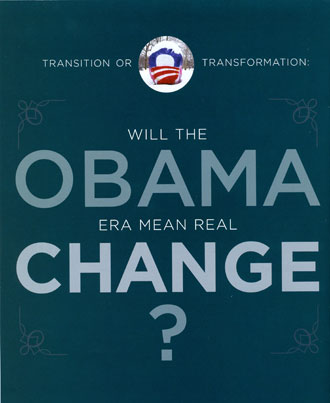
As the first African American to hold the position of president of the United States, Barack Obama is assured a prominent place in history. But the change on which Obama campaigned went well beyond his own demographics. Now, in the early stages of his presidency, questions remain about what this change will look like. Are we merely in the midst of a simple transition—one president to the next, one party to the other—or at the dawn of new era, a time of genuine transformation?
That is the question the Oberlin Alumni Magazine posed to a number of Oberlin faculty members. Their answers, which drew deeply from their readings of history, poetry, philosophy, and religion—and from watching a little television, ranged from the personal to the satirical.
We’ll grapple with issues in a
new way … and with a new "we."
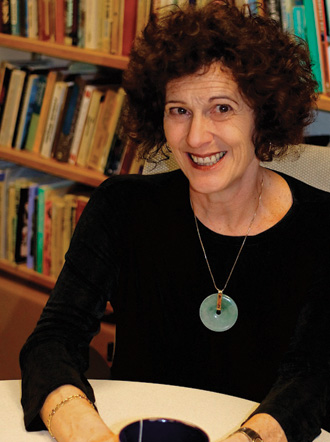 (photo by Gary Cohen ’11)
(photo by Gary Cohen ’11)
Does Obama mean change? Absolutely! In this community of progressive American historians where I work, Barack Obama’s election is an electrifying, unanticipated, and much celebrated breakthrough. Ten years ago, five years ago, maybe even 18 months ago, it seemed impossible. So many of us, for so many years, have confronted in our scholarship the distortions wrought by a long shadow of racism and the ugly legacy of slavery. The election of a black man to the highest office in the nation reaffirms for us the efficacy of—and necessity for—struggle, the belief that forward-looking change is possible. Certainly, we still have far to go to achieve social justice; the election of Barack Obama did not eliminate racism or racial poverty, nor did it immediately create alternatives to a failing economy that disproportionately impacts working people of all races. It did not instantaneously educate millions of children trapped in failing schools, or create new opportunities for those who crossed borders to make better lives for themselves and their families in the United States. It did not straight away end American engagement in wars of aggression, and it did not overturn a legal system based on fundamentalist-inflected heteronormativity. But after this election, we will grapple with the most American of dilemmas—race—in a new way. And it will be a new "we."’
Moreover, neither party can ever again fail to take women candidates seriously—both because Hillary Clinton’s challenge demonstrated that women of talent and achievement are formidable factors, and because the backlash against Sarah Palin underscored that women and men are concerned about gender justice, beginning with quality of mind, not particularities of plumbing.
But more than this, Barack Obama’s election brought to the ballot box millions of first-time voters—young people, people who had previously felt disenfranchised, people who had given up on the system. Barack Obama has renewed my belief in democracy; I want to think that his election reinvigorated democracy, not just as discourse or performance, but as a framework for participatory civic life. Is that enough? Not yet. In the words of black feminist activist Ella Baker—words that Sweet Honey in the Rock sang with us in Finney Chapel just after this historic election—"We who believe in freedom cannot rest."
One step closer
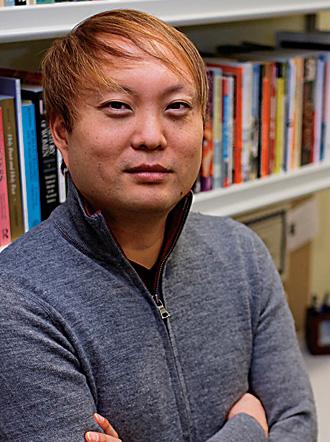 (photo by Gary Cohen ’11)
(photo by Gary Cohen ’11)
As I watched the election night results with a raucous group of Oberlin colleagues, I had a really random thought. After Pennsylvania and Ohio had been called for Obama, finally making it clear to everyone that he was going to win, I thought, ‘Who are they going to get to play the president in movies now?’
There has been an interesting history of black actors playing the president, usually in comedies such as Chris Rock’s Head of State or in futuristic science fiction films such as Deep Impact with Morgan Freeman or The Fifth Element with Tommy Lister. In recent years, the television series 24 has contributed more interesting representations, with two black actors playing the president. The West Wing elected the first Latino president in its final season. In each case, there was a sense of fantasy or future or both, either implicitly or explicitly, through such casting. We know it is the future because a year ago, very few people could have imagined the election of the first black president.
So, on one hand, the election of Barack Obama was, in a very real way, a transformative moment in terms of possibilities in this country. It brings us closer to Martin Luther King’s dream of social justice, and we should not underestimate how meaningful these moments are in our history. We should appreciate and celebrate them to the fullest. On the other hand, the election was not the realization of racial reconciliation in our country, but rather one step, albeit an important one, toward the goal of racial justice. As commentator Tavis Smiley recently pointed out on Meet the Press, King himself cautioned against placing too much significance on "black faces in high places" after the election of the first black mayor of a major U.S. city, Carl B. Stokes, more than 40 years ago in Cleveland. Representation is only part of the struggle for meaningful social change, and race remains important, despite chants by Obama supporters that "race doesn’t matter" at celebrations of his wins in the Iowa caucus and the South Carolina primary.
Discourse around Obama’s middle name, his family’s immigrant history, his masculinity—remember how his bowling and playing basketball, his patriotism, and his community organizing experience were all racialized—represent powerful evidence that race does still matter and much work needs to be done. If an Obama administration is going to produce "change we can believe in," then we should look to his example of community organizing —not as a questionable experience, as some on the political right have argued, but rather as a powerful and proven model for moving forward. To quote another pop culture president, Josiah Bartlett, we all need to ask, "What’s next?" and continue the hard work in our communities that helped make Hollywood fiction a possibility.
Beyond Neoliberalism
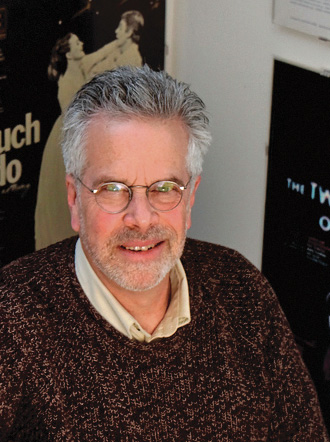 (photo by Gary Cohen ’11)
(photo by Gary Cohen ’11)
The election of Barack Obama turned out to be an existential experience for me. I’ve been depressed about American (and world) politics my entire adult life. This has been especially painful in light of the excitement of the 1960s, the formative period that shaped my politics and, indeed, my choice of a career studying Chinese politics. For some time I had been profoundly despondent and regretful about the kind of world that we of the ’60s generation had, in the end, willed to future generations—especially to my kids and grandson.
It’s only with the fullness of time and a good dose of an approach to political economy known as régimes of accumulation theory that I now realize that the ’60s weren’t the bright beginning of anything, as we mystified young idealists thought. Rather, from a materialist perspective, they marked the end of something—the last gasp of "Fordism." That was named after Henry Ford, who invented the $5/day wage when he realized he could make more money by paying his workers better so they would be more productive and have money to buy Fords. Fordism lasted from the Great Depression until the early 1970s. It involved an activist government role in regulating the economy and redistributing income, the acceptance by capital of organized labor, and a decent standard of living for the white, male working class. We children of ’50s and ’60s liberalism tried, in good dialectical style, to "complete" or "perfect" it into something truer to its own professed values by extending its gains to women and African Americans. Fordism was also premised on U.S. supremacy in the world, and we demanded that the Pax Americana live up to its name. Though we couldn’t see it at the time, by the end of the 1960s, Fordism was collapsing due to international competition and internal rot, as labor and management both grew flabby from enjoying their relative accommodation. That is why the ’60s were doomed to fail; Fordism couldn’t even survive, much less be perfected.
It was replaced by neoliberalism, a new régime of accumulation characterized by radical deregulation, the loss of American dominance in the world, globalization, financialization, and economic "flexibility." We all now know where that got us economically. Politically, for me, it was a disaster too, serving up Reagan, the Bushes, and the radical right, punctuated only by occasional mild relief (Carter, Clinton) and some progress on middle-class social conflicts (e.g., gender, sexuality, and environmental awareness) that neoliberalism would allow so long as they didn’t adversely affect the capitalist economy. Yet despite a highly ideological misconception to the contrary, neoliberalism actually produced slower growth than Fordism, while also racking up stupendous increases in inequality. And don’t even mention the environment. This was the world in which a progressive like me spent a whole adult life, and which I seemed doomed to bequeath to my sons and grandson—a far cry from the imagined utopias of the 1960s.
But 2008 proved different. For much of the year, I was, like so many on the left, unconvinced by Obama’s vague call for "change." Soon, though, the underlying logic began to become apparent to me—and perhaps to him too. Neoliberalism itself was dying after its 35-year run, and the moment for a new régime of accumulation had arrived. Each time a régime of accumulation collapses and a new one must perforce replace it, an important president can appear. When the despotic capitalism of the 19th- and early 20th-century gave out, we got FDR. When Fordism, which he ushered in, died, we got Reagan. With the collapse of neoliberalism, it was Obama’s turn.
So for the first time since 1972, I threw myself into mainstream politics again, volunteering way more hours and donating way more money than I could sensibly afford. The Palin nomination didn’t hurt—she didn’t just mobilize her own base. Marx said it best in the Eighteenth Brumaire, which I still teach to a large crowd (for which I am so grateful to Oberlin): "Hegel remarks somewhere that all great world-historic facts and personages appear, so to speak, twice. He forgot to add: the first time as tragedy, the second time as farce." Nixon and Reagan were the tragedies, and Bush and, finally, Palin were the farce, the latter not just because of Tina Fey.
Things are bad right now, and they had to be. And of course it’s the poor who suffer the most. Marxian theory teaches me that big structures die hard. But the depth of the crash indicates the profundity with which neoliberalism has destroyed itself. Rahm Emanuel recently said that we should never waste a good crisis. In China, the word for crisis is comprised of two characters: wei (danger) and ji (opportunity). If I take the longer view, I’m actually happy the crisis, which had to come sooner or later, is finally here. For it, and Obama with it, offer the opportunity to build something much better.
Real change?
Only if Obama means what he says.
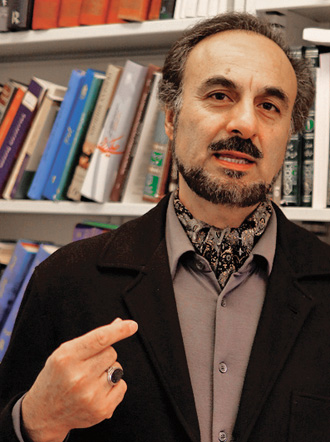 (photo by Gary Cohen ’11)
(photo by Gary Cohen ’11)
One of the things to consider in determining whether Obama’s presidency is "transformational" or merely "transitional" is knowing the world’s expectations of his administration.
My field is Islamic and Middle Eastern studies. To look at that question from this specific angle, I have to talk about this administration’s image in the Muslim world, because that image may influence policymaking. Looking at Obama’s "literature," or what he conveys to the Muslim ear in his speeches, I say his presidency is transformational. But not only because of his literature, which is eloquent, but by who he is. The symbolism of his being in office is transformational because it destroys worldwide stereotypes about America.
I recently returned from Iran, where I met with many clergymen, laymen, and politicians, and I can already see the difference. Their image of America has changed, and for the better.
Last year when I talked with them about the possibility of Obama becoming president they said, "No—that would never happen in America as we know!" In the U.S., some say, Obama was successful in part because "we didn’t see his color." But the rest of the world did. They know the history of racism in the United States, and this election has changed their view of Americans. This leaves huge momentum in the hands of Obama’s administration to tear down international and intercultural walls of separation and mistrust created by many wars of the last decade.
It is too early to see what percent is transition and what percent is transformation, but we see that Obama has chosen many known figures, many known faces, such as Secretary of State Hillary Clinton, Special Representative for Afghanistan and Pakistan Richard Holbrooke, and Special Advisor for Persian Gulf and Southwest Asia Dennis Ross for his State Department. While the Obama administration’s major focus so far has been in economic policies, his foreign policy apparatus shows only transition, not transformation. However, if this apparatus were to continue, in words and action, along the lines of Obama’s friendship and justice-oriented literature regarding foreign affairs, we can expect transformation.
Whether the Arab-Israeli conflict will be the center of U.S. attention in the Middle East, as it has been for previous administrations, or whether the Obama administration will have a more comprehensive view of the region and engage in many other important matters, it is too early to tell. Most people in the Muslim world are expecting transformation. In the next six months, they will decide whether they are right or wrong.
Obama said in his inauguration speech vis a vis the Muslim world that he would pursue a policy of justice and respect. To strong-arm governments he said, "We will extend a hand if you are willing to unclench your fist." Already these lines have produced positive responses. But they must also come from the mouths of other policymakers in the state department. Obama’s diplomats, if they want to be effective, must talk with a language sensitive to other cultures and understand their mores and metaphors. It is time for the state department to hire some poets.
An invitation to the harder work
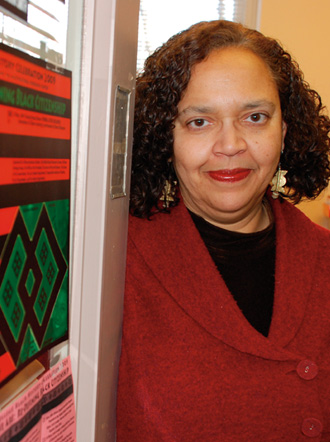 (photo by Jeff Hagan ’86)
(photo by Jeff Hagan ’86)
On November 4, 2008, I found myself glued to my television set, wondering if this really was the moment when our country would make one of those rare and historic leaps. As I watched the rising tide of support for Barack Obama, I realized that every sacrifice made by generations of people since the African slave trade had really mattered; that historic shifts are the accumulation of actions big and small over a vast landscape of time and place, a cavalcade of ordinary sheroes and heroes who fixed their eyes on a prize beyond human vision, and who made painful choices for a liberation they may never have physically experienced.
As an African American who traces at least seven generations in this country and who came of age in a generation charged with marching through long-closed doors, I felt affirmed, uplifted. As an African Americanist who has spent 40 years pressing America to see and own its real history, I felt astonished that the average news reporter now discussed matter-of-factly that which we teach every day in our classes at Oberlin, but which average Americans often know nothing about. When Ohio turned blue, I felt certain that Obama and the Democrats would win. When the election was declared, I heard the echoes of revelry from downtown Oberlin as our students, who had worked so hard, celebrated with the rest of the world, feeling that sense of power, connectedness, and real citizenship that was so much a part of my youth in the movement.
But having studied America’s ability to slip behind the veil of denial for most of my life, I hear the term "post-racial America" and know this is just a moment for continuing the real work of taking apart centuries of distorted beliefs about Africana cultures and people, those that provided the foundation for unspeakable acts of oppression and a template for other forms of prejudice and inequality. Our national statistics on criminalization, poverty, education, and housing disparities tell us that the deep historic racial divides have not been healed, and President Obama’s election is an opportunity not to declare ourselves beyond race, but to be invited into the harder work of becoming the beloved community Martin Luther King envisioned. As Tim Wise notes in his book Between Barack and a Hard Place: Racism and White Denial in the Age of Obama, now is the time to redouble our efforts to dismantle racism and other forms of inequality, remembering King’s admonition that "change does not roll in on the wheels of inevitability, but comes through continuous struggle."
Obama may mean change, but not the change he means.
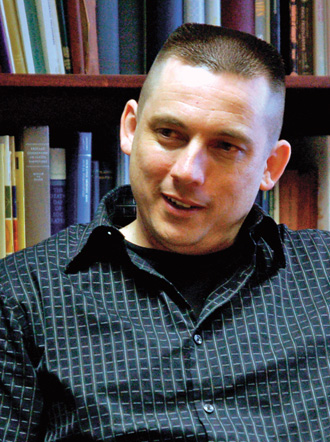 (photo by Ma’Ayan Plaut ’10)
(photo by Ma’Ayan Plaut ’10)
During his campaign, the term "liberal" was wielded disparagingly against candidate Obama. It is not impossible that by the end of his first term President Obama will be a term of disparagement among liberals.
Contemporary liberalism is a hybrid political ideology. On the one hand, liberalism endorses some set of robust political rights. Freedom of expression, freedom of association, the right to privacy, freedom of choice in lifestyles, and a range of protections for the accused in criminal procedures are prominent examples.
On the other hand, contemporary liberalism is not so protective of what we might call economic liberties. When it comes to redistributive taxation, or affirmative action, or environmental regulation, liberals claim that such policies do not implicate serious rights. Taxation to fund the welfare state does not infringe any right of taxpayers to the income they otherwise would have retained. Regulation on business activity, for purposes of affirmative action or environmental regulation, does not infringe on any rights of business owners to conduct business in a way they would otherwise prefer.
Liberalism falls short in underestimating the importance of economic liberties to the overall social good. A less regulated and more lightly taxed market economy produces a range of social goods: innovative experiments whose risk is borne by individuals but whose benefits are enjoyed widely, increases in efficiency brought about by the closer knowledge of private investors of their investments, innovation brought about by the sheer diversity of private investors, the ability of minority preferences to be satisfied without popular approval, and so on. Furthermore, the practical liberty of citizens to pursue a diversity of lifestyles, interests, and careers is enhanced where state interference with commercial activity is reduced.
So we arrive at the presidency of Barack Obama. President Obama will oversee more than a trillion dollars in new deficit spending, dollar-destroying federal debt, growth-slowing labor regulations, fantastic amounts of wasted aid to large industries, the federal government’s collecting unto itself the detailed medical records of all American residents, the continued surveillance of all our Internet activity, and continued dismissal of criminal due process, to name only some of the more prominent policies.
Even liberals may thus find themselves voicing a long-standing complaint about a liberal state. Direct government control over large parts of what would otherwise be the private economy brings systematic problems, problems that are not simply the result of a particular president, or particular party controlling the Congress. Even when it is not abusive—and a powerful government inevitably will be—enormous government makes us poorer and less free.
American liberals, in short, might find that their inevitable disenchantment with their charismatic leader is more than a personal disappointment. They might find their hopes for government itself are permanently dashed. It would be no small irony if this were the lasting change wrought by the Obama administration.
Our new best Friend?
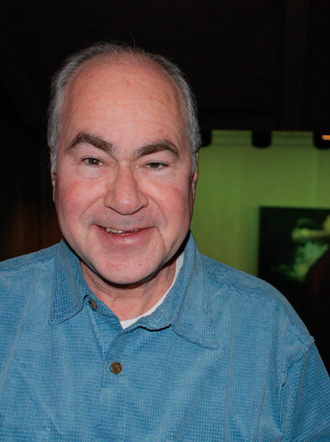 (photo by Jeff Hagan ’86)
(photo by Jeff Hagan ’86)
By now, you would have to be living in fact-free limbo to believe Barack Obama is a "secret Muslim," as some opponents suggested during the campaign. I think it is possible, however, that he’s a "secret Quaker"—so secret he himself has yet to recognize his true religious calling.
I don’t base this claim solely on the fact that the Obamas chose the Sidwell Friends School, a prestigious Quaker institution in Washington, D.C., for their two young daughters. Rather I see many of the values of the Religious Society of Friends, or Quakers, exemplified in the way their father campaigned for the presidency, and is governing. Is there anyone else in public life today who embodies the Quaker ideal of "stillness" and inner peace more than the man known as "No Shock Barack. No Drama Obama"? Complementing that unflappable cool is the warmer, more ingratiating side of Obama’s public persona: the easy way he lights up a room, the incandescence derived from the sheer candle power of his smile. A manifestation perhaps of what Quakers refer to as the "inner light" that they seek in all people. The official credo of the Sidwell Friends School, for example, is "Eluceat omnibus lux" or "Let the light shine out from all."
Quaker teachings have their own distinctive vocabulary, phrases such as "active listening," "outwardly-directed witness," "intentional community," as well as more familiar-sounding concepts such as "interfaith worship." Obama may not always talk the Quaker talk, but he does seem to embrace "active listening." In directing his faith outwardly toward the community, he seems to walk the Quaker walk.
But what clinches for me the "Obama as secret Quaker" argument is the affinity between his belief in bipartisanship—perhaps even post-partisanship—and the distinctive method of group decision-making practiced by Quakers: consensus. When it works, consensus is truly transformative. The concept of winners and losers—and the accompanying fear that the losing minority may be bullied or even tyrannized by the majority—gives way to a process that seeks to resolve, or at least mitigate, minority concerns. Above all, for practitioners of consensus, the process itself is as important or even more important than the product it produces. But as any resident of an Oberlin co-op or any faculty member of a Quaker school can tell you, when consensus doesn’t work, the process can be downright torturous.
For Obama, bipartisanship does not appear to be merely a means to an end (e.g. a strategy for obtaining the best possible stimulus package). It’s an end in itself—a whole new, tone-changing approach to bi-party governance—one that deserves to be defended above and beyond the specific results it yields. Why else would Obama have originally envisioned a stimulus package that might garner 80 votes in the Senate as opposed to the more realistic and still veto-proof number of 60? That also helps explain why Obama preemptively offered the Republicans $300 billion worth of tax cuts before serious negotiations had begun.
Obama knows the concept of "consensus"—indeed, the desirability of ever arriving legislatively at something akin to consensus—was the single biggest casualty of the era of hyper-partisanship in American politics. That Red State/Blue State era was pioneered by Lee Atwater, perfected by Karl Rove and his wedge issues like same-sex marriage bans, and is most evident today in the person of Rush Limbaugh, who appears to be functioning as the de-facto head of the Republican Party.
Therein of course lies the problem with attempting to govern the U.S. as a consensus-seeking Quaker. Obama has reached so often and vigorously across the aisle that he’s in danger of dislocating his right shoulder. How many times can you extend a hand in search of consensus only to be ignored or rebuffed? The answer for Quakers is: as often as necessary.
With not a single Republican in the House and only three Republicans in the Senate willing to vote for the stimulus bill, bipartisan consensus amounts to an unrequited gesture on Obama’s part. There is, of course, a method to the madness of this Republican intransigence. The Republicans want to do to Barack Obama what Newt Gingrich and Bob Dole did to Bill Clinton in 1994. If they can weaken Obama’s initiatives just enough to prevent them from reviving the economy, then the GOP has a reasonable chance of changing the balance of power as early as two years from now. Once again, it’s the economy, stupid, that will determine whether or not Obama can achieve something as "transformational" as the New Deal.
But it may prove transformative in itself if Obama continues to govern like a Quaker. If nothing else, he’s bound to be an improvement over the two American presidents who actually were raised as members of the Religious Society of Friends. Believe it or not, our only two bona-fide Quaker presidents were Herbert Hoover and Richard Nixon. With Friends like those …
Oberlin and the Inauguration
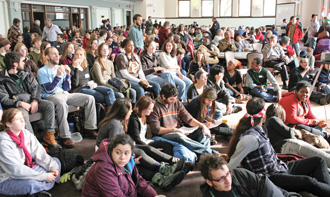 (photo by John Seyfried)
(photo by John Seyfried)
Oberlin observed the Barack Obama inauguration with one event under two roofs, organized by representatives of the College and broader Oberlin community. About 700 people gathered in the College’s Root Room and another 200 went to the Mt. Zion Baptist Church Fellowship Hall in Oberlin to watch the historic event on large screens.
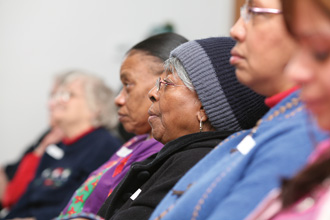 (photo by John Seyfried)
(photo by John Seyfried)
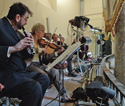
(photo by Dan Shore)
Oberlin was also represented at the inaugural events in Washington. Conservatory professors Michael Lynn and Marilyn McDonald joined with fellow members of the Smithsonian Chamber Players on period instruments at the Inaugural Luncheon, to perform selections from Thomas Jefferson’s extensive music library (behind them in photo is Kenneth Slowik, artistic director of the Oberlin Baroque Performance Institute who is also artistic director of the Smithsonian Chamber Players). Two hundred guests, including the president and vice president and their families, the Supreme Court, members of the cabinet and the congressional leadership, attended the luncheon, a century-old tradition held at the Capitol’s Statuary Hall.
